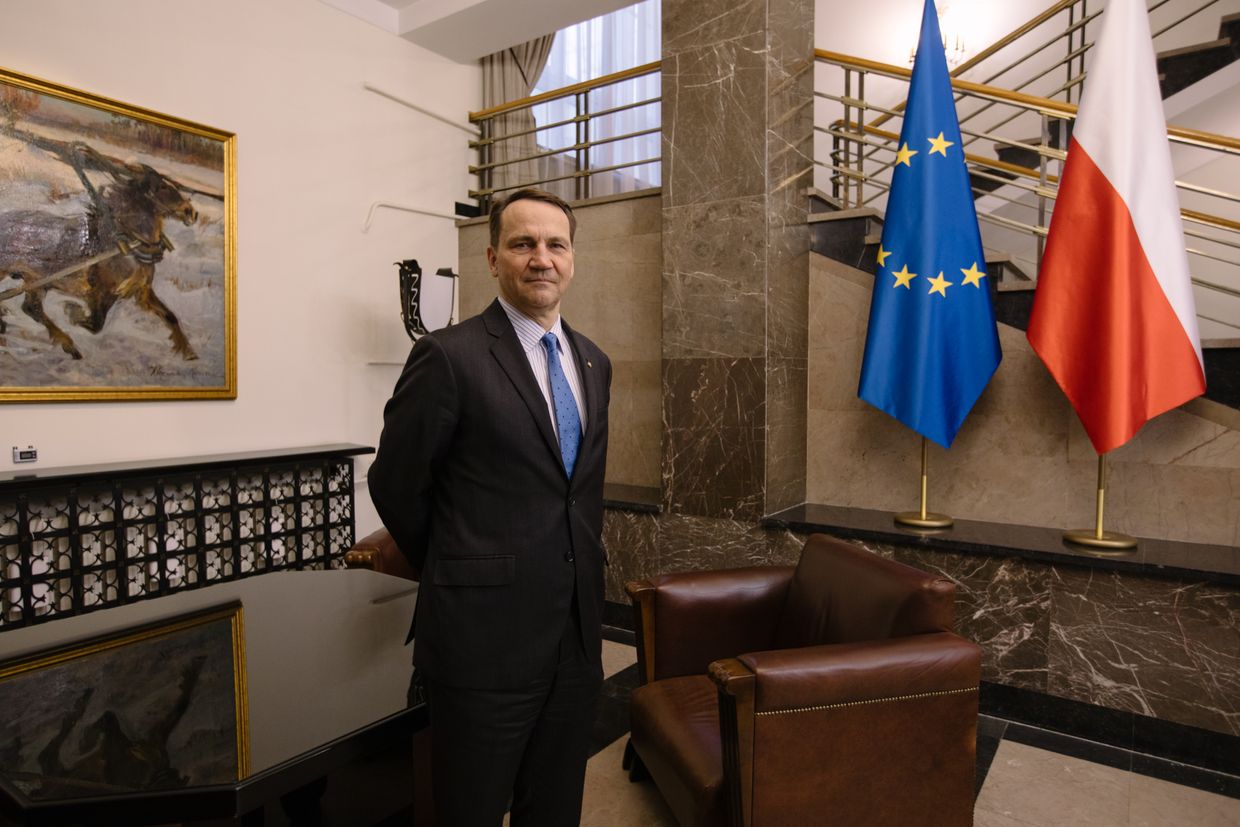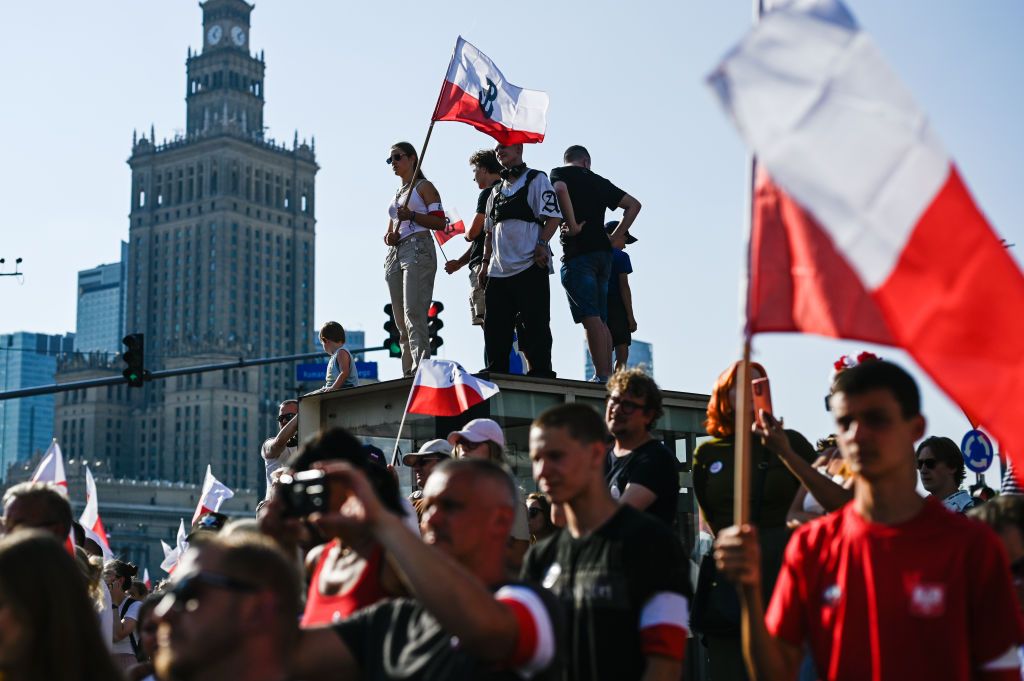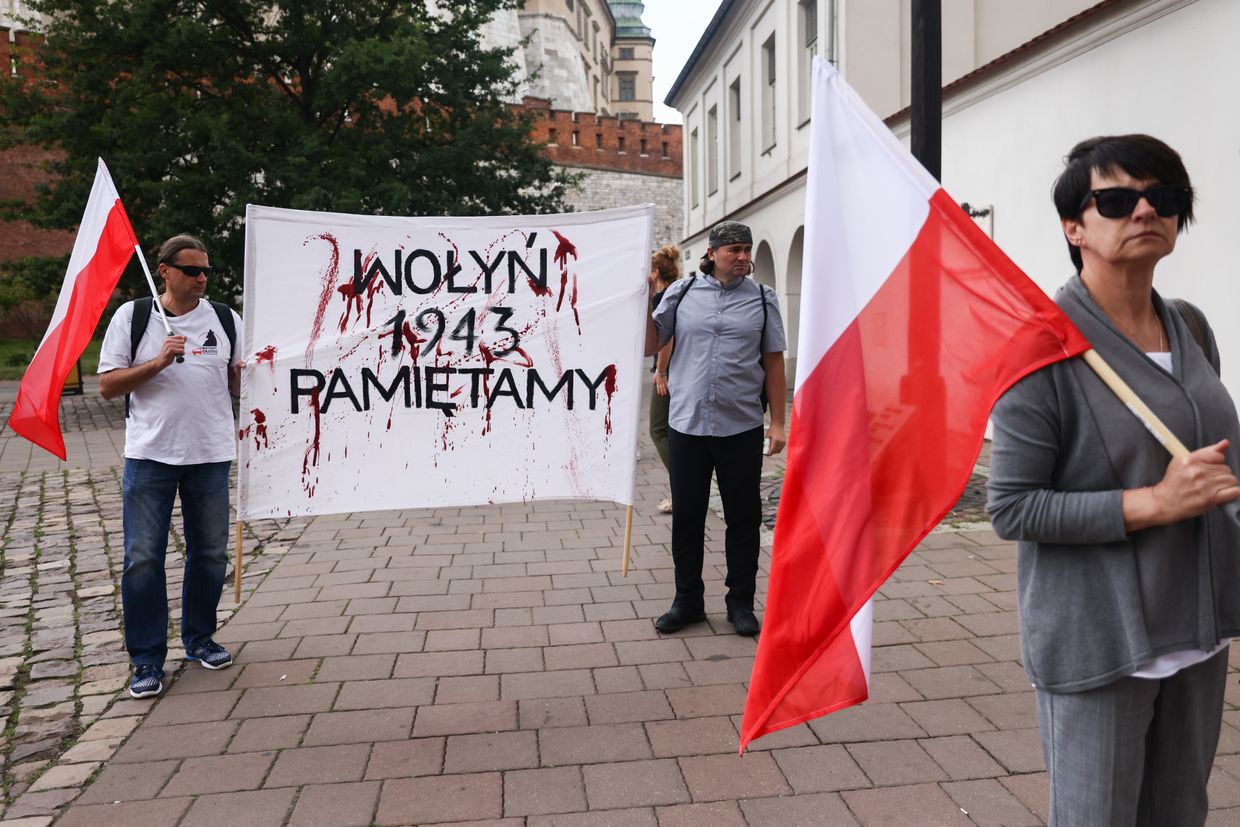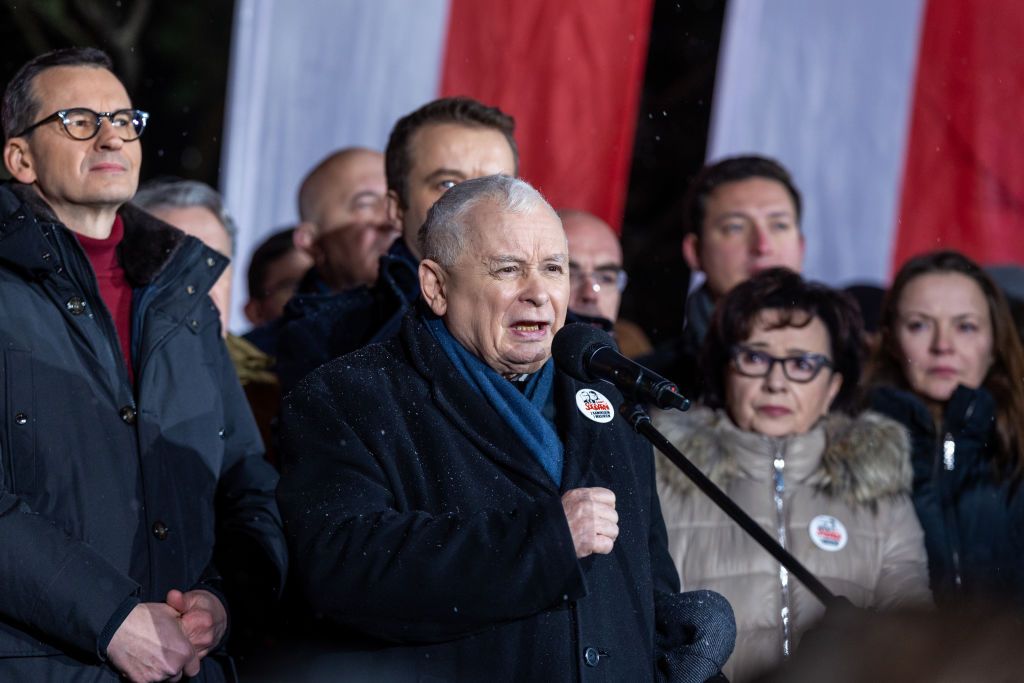Poland-Ukraine relations deteriorate as historical grievances resurface, threatening to stall Kyiv’s EU accession

President Volodymyr Zelensky and his Polish counterpart Andrzej Duda commemorate the victims of the Volyn Massacre in the Ukrainian city of Lutsk on July 9. (President Volodymyr Zelensky/Telegram)
The meeting between President Volodymyr Zelensky and Polish Foreign Minister Radoslaw Sikorski on Sept. 13 in Kyiv did not exactly go as planned.
Sikorski demanded Ukraine finally allow the exhumation of the victims of the Volyn massacre in World War II and warned against expecting a quick EU accession, sparking frustration from Zelensky, according to the Kyiv Independent's sources familiar with the matter.
Ukraine's president reportedly accused Warsaw of politicizing historical events, falling short on promised military aid, and not fully backing Ukraine's path to EU membership.
Zelensky later shared a negative opinion about the meeting with a number of people behind closed doors.
Relations between Ukraine and Poland have turned sour. Again. And the tune is much the same – a World War II massacre that has been at the center of bilateral relations between the two countries since the 1990s.
Poland has been one of the strongest supporters of Ukraine since the start of Russia's full-scale invasion in February 2022, providing billions of dollars in military, economic, and humanitarian aid and hosting millions of Ukrainian refugees.
The country has also been a vocal supporter of Ukraine on the world stage, campaigning for Ukraine to receive all the required weaponry to win the war that Russia had begun.
Yet, bilateral relations are far from perfect, with the two countries sharing long-standing grievances that are far from being resolved.
In 2023, Warsaw banned Ukrainian agricultural imports amid large-scale protests from Polish farmers who complained about the domestic market’s oversaturation with Ukrainian grain. This was followed by a months-long border blockade by Polish truckers over the EU's liberalization of transit rules for Ukrainian carriers, worsening tensions and harming Ukraine’s economy.
The conflict was resolved, yet political tension remained, despite a new government in power.
A year later, a new conflict is brewing, this time a historical one.
Poland has long pushed for exhumations of victims of the 1943 Volyn Massacre, the killings of tens of thousands of Poles by members of the Ukrainian Insurgent Army (UPA) in the German-occupied Volyn region, now part of Ukraine. Thousands of Ukrainians were killed in retaliation.

Ukraine blocked the exhumation in 2017 after Ukrainian Insurgent Army (UPA) memorials in Poland were vandalized. Kyiv has said it is open to lifting the ban once all memorials are restored.
Neither happened.
The conflict is now in the open, and a resolution seems unlikely without political will from both sides.
“Polish-Ukrainian relations have been shaped by the interplay of historical legacies, domestic politics, and external factors, with the trajectory being de facto a sinusoid. We have seen ‘highs and lows’ in the past, and this is likely to continue in the foreseeable future,” said Andriy Korniychuk, a policy analyst at the Institute of Philosophy and Sociology of the Polish Academy of Sciences.
“What is different now as opposed to the previous decade is an unprecedented level of political polarization in Poland in 2024, driven by political forces on both sides of the ideological spectrum in recent years.”
Little understanding between Kyiv and Warsaw
In July, Polish Defense Minister Wladyslaw Kosiniak-Kamysz said that Ukraine would not join the EU without resolving the historical issue of the mass killings of Poles in Volyn.
Polish Prime Minister Donald Tusk later supported this statement, adding that "Ukrainians must understand joining the union means entering the sphere of standards related to political and historical culture," as cited by the Polish Press Agency.
Onet reported, citing an anonymous source, that the Polish Foreign Ministry might use Ukraine's EU bid to pressure Kyiv on the Volyn issue during Warsaw's presidency of the Council of the European Union in 2025.
Polish President Andrzej Duda said, however, that threats to block Ukraine's accession to the European Union are in line with Kremlin policy.
The foreign ministries of Ukraine and Poland did not respond to the Kyiv Independent's requests for comments at the time of publication.
Ukraine is reportedly frustrated with Poland raising WWII-era issues during Russia's ongoing war when Ukraine urgently needs support from allies to survive. However, Warsaw sees no contradiction between trying to resolve the exhumation issue and helping Ukraine in its war with Russia, according to Daniel Szeligowski, head of the Eastern Europe Program and chief analyst on Ukraine at the Polish Institute of International Affairs (PISM).
"From the Polish point of view, it is difficult to understand why Germany can carry out the exhumation of fallen Wehrmacht soldiers on Ukrainian territory, but Poland cannot exhume the bodies of its own citizens. This in no way affects the position of the Ukrainian army at the front line," Szeligowski told the Kyiv Independent.
Ukraine maintains that Poland has failed to fulfill its part of the agreement, including restoring a memorial plaque on the grave of Ukrainian Insurgent Army fighters on Mount Monasterz near the border with Ukraine to its original form. The plaque was physically repaired after vandalism in 2015 but without the names of fallen UPA fighters on it.
Both countries differ on how to interpret the Volyn massacre, with Poland labeling it genocide for which UPA is fully responsible and Ukraine denying the term and pushing for recognizing mutual responsibility for the killings. Ukraine and Poland also don't agree on the number of victims.
Szeligowski said the exhumation issue arises every year around the tragedy's anniversary in July, regardless of who's in power. But this time, tensions worsened after a controversial comment by former Ukrainian Foreign Minister Dmytro Kuleba during a meeting with young people in Poland in August.
When asked about why Ukraine is not allowing the exhumation of the Volyn massacre victims, Kuleba moved the topic to the Polish operation Vistula, a forced resettlement of thousands of Ukrainians traditionally living in southeastern regions of Poland in 1947. Kuleba referred to the operation as occurring on "Ukrainian lands."
Kuleba's statement angered Polish politicians, mainly from the Law and Justice Party (PiS), who accused Kuleba of making territorial claims. Ukraine's Foreign Ministry, in a comment to the Polish Press Agency, denied the allegation and clarified that Kuleba meant areas historically inhabited by Ukrainians.
The friction continued when Sikorski suggested during an off-the-record meeting at the YES conference in Kyiv on Sept. 19 to put Crimea under a U.N. mandate and carry out a referendum on the peninsula, which has been under Russian illegal occupation for over 10 years.
The Crimean Tatars' chief executive-representative body dismissed the proposal about Crimea's status as "unacceptable and cynical," while Ukraine's Foreign Ministry said that "the territorial integrity of Ukraine has never been and cannot be a subject for discussion or compromise."
Kyiv is also reportedly unhappy with Poland's delay in contributing to the Czech-led ammunition procurement for Ukraine and its reluctance to help defend Ukrainian airspace. Warsaw had committed to considering such a possibility in a bilateral security agreement signed by the two countries on July 8, but the Polish defense minister quickly stepped back, citing the lack of a NATO-level decision.
Sikorski cited the detention of a key official as the reason for the delay in transferring the funds for ammunition procurement, promising 100 million euros for the initiative by 2025.
‘The narrative of Ukraine is changing’
Over two years into Russia's full-scale war, Polish sentiment toward Ukrainian refugees is shifting, with 61% wishing they would return home after hostilities end, according to a June poll from the Warsaw University and Warsaw Academy of Economics and Humanities. Only a third of Poles strongly believe their country should continue helping Ukraine, down from 62% in January 2023. Additionally, 72% think Poland should prioritize its own interests, including agricultural exports.
“The narrative on Ukraine is changing in Poland,” said Yaroslav Hrytsak, a Ukrainian historian and writer.
He noted a rising discourse in Poland, potentially fueled by Russia, claiming that "Ukrainians are taking our jobs, receiving social benefits that we do not have, and what’s more important, they have a different mentality."


This shift is reflected in Polish politicians’ increasing criticism of Ukraine as they prepare for the May 2025 presidential election, experts say.
Kosiniak-Kamysz's remarks on the Volyn massacre align with the sentiment of his agrarian party, while Tusk and Sikorski's comments may aim to steal voters from the Law and Justice Party (PiS), which is conservative and had long focused on the country’s historical grievances, according to Dr. Stanislav Zhelikhovskyi, a Ukrainian political scientist and a corresponding member of the Ukrainian Academy of Geopolitics and Geostrategy.
Sikorski’s suggestion of a potential referendum in Russian-occupied Crimea could also be a political maneuver targeting a more conservative electorate as he likely eyes a presidential bid, Zhelikhovskyi told the Kyiv Independent.
Korniychuk also highlighted the significance of historical narratives and their influence on public discourse and political mobilization in Poland.
“It comes against the (backdrop) of a European trend that sees far-right parties and movements gaining an alarming level of mainstream recognition,” he said, speaking with the Kyiv Independent.
“Therefore, the ruling center-left coalition in Poland simply can’t allow itself to refrain from leaving these issues unaddressed, thus allowing center-right, conservative, nationalist, and radical political forces to set the temperature of the discussion but also actively exploit different messages in their own political campaigns.”
Conversely, Szeligowski argues that the deterioration of the Volyn massacre dispute reflects unmet expectations rather than political agendas. After the Russian full-scale invasion, many Polish politicians hoped that Warsaw’s large-scale support for Ukraine would prompt Kyiv to unblock the exhumations, according to Szeligowski.
“As this did not happen and recent statements from the Ukrainian side were widely perceived in Poland as antagonistic, a consensus has emerged among the main political forces in Poland that the policy towards Ukraine had been too little assertive and too little transactional,” he said.
What to expect next in Poland-Ukraine relations?
With Poland's presidential elections approaching and no resolution in sight over fundamental disagreements on the Volyn massacre, the Polish-Ukrainian conflict will likely persist.
"This pre-election game will continue for months, likely with more criticisms and actions from Polish politicians seeking to win votes," said Zhelikhovskyi. He predicts that relations may stabilize after the elections, but they won't return to the "honeymoon" period of 2022.
"This pre-election game will continue for months, likely with more criticisms and actions from Polish politicians seeking to win votes."
Hrytsak believes neither country has the political will to resolve the issues of exhuming Volyn massacre victims or restoring Ukrainian memorials in Poland, suggesting both sides may be using the conflict for political gain.
Hrytsak suggested that Zelensky's team might use Polish threats to block Ukraine's EU membership over the Volyn massacre to shift blame onto Poland for what would likely be a slower accession than the government had promised Ukrainians.
Szeligowski believes that "the greater the delay by Ukraine in unblocking the exhumations, the greater the political cost that Ukraine will bear in the future."
"First, Poland may reduce its diplomatic activity in support of Ukraine — instead of being always in the front row and keep mobilizing allies, Poland may stand in the rear pragmatically like Germany or simply be passive," said Szeligowski.
He also noted that the ratification of Ukraine's EU accession treaty might not only run into problems in Poland due to the lack of a parliamentary majority but even be put to a referendum, with uncertain outcomes if historical disputes persist.
However, simply allowing the exhumation of the Volyn massacre victims and restoring Ukrainian memorials in Poland would not be enough for a full reconciliation between Ukraine and Poland, which saw multiple conflicts in the past.
To ensure good neighborly relations, Ukraine must officially take responsibility for the Volyn massacre as an act of ethnic cleansing, while Poland should admit to its repressive policies against Ukrainians prior to the massacre, said Hrytsak.
However, it's hard to imagine Ukraine admitting that some of its national resistance forces had conducted ethnic cleansing during World War II amid Ukraine's existential fight against the Russian war of aggression, which kills Ukrainian civilians on a daily basis. Therefore, Hrytsak believes the Polish-Ukrainian conflict will unlikely be solved until the end of Russia's war.
Korniychuk echoed this statement, saying that “amid an ongoing brutal war, it is extremely difficult to contest and revise historical narratives and symbolic spaces as it requires a thorough process of public debate and consultation, which is de facto impossible during martial law.”
“Hence, we can also observe Russia's deliberate targeting of these contentious historical issues in its propaganda and disinformation campaigns against both countries at what seems to be another critical juncture during the full-scale war,” he added.
Korniychuk suggested that Poland and Ukraine should try to find common ground in the framework of strategic communication, ensuring that the challenges are recognized even if addressing them would take time.
“In the end, silence and disagreements simply allow other malicious actors, such as Russia, to impact or hijack the narrative.”
















